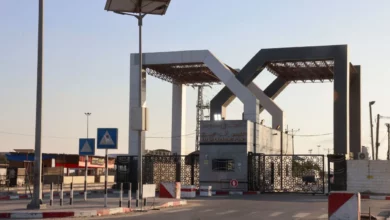Washington–US Secretary of State Hillary Clinton on Thursday urged Arab states to do more to back Israeli-Palestinian peace moves while warning Syria against arming Lebanon’s anti-Israeli Hezbollah.
But Clinton, speaking to a pro-Israel group, said she also expected Israel to halt settlements in occupied land, meet the humanitarian needs of Gazans, and help the Palestinian Authority build institutions needed for statehood.
“We do not expect the Arab states to move forward in a vacuum,” the chief US diplomat said in remarks to the American Jewish Committee.
President Barack Obama’s administration is trying hard to relaunch indirect Israeli-Palestinian peace talks that were aborted last month when the right-wing Israeli government announced new settlements in east Jerusalem.
Clinton also urged the US-backed Palestinian Authority — which controls only the West Bank and not the extremist Hamas-run Gaza Strip — to continue its work to improve security and stop anti-Israeli militancy in the West Bank.
Although she hit familiar themes, Clinton was more explicit than in the past about what steps the Arabs should take for peace after they ignored previous pleas because of what they consider Israel’s intransigence.
“They should take specific steps that show Israelis, Palestinians and their own people that peace is possible and that there will be tangible benefits if it is achieved,” Clinton said in a speech to a pro-Israel group.
The chief US diplomat urged Arab states to offer more financial support to the Palestinian Authority and its two-year development plan as well as move toward ending Israel’s isolation by opening or re-opening trade offices.
“The United States has done our part, becoming the PA’s largest bilateral donor, and Europe also has stepped up,” she said. “Arab states need to share a greater portion of these responsibilities.”
Gulf Arab states like Qatar and Oman closed Israeli trade offices in 2000 when the Oslo the peace process collapsed in violence. Qatar closed the Israeli trade office when Israel launched an offensive in Gaza in December 2008.
Clinton also suggested that Arab states grant Israel the right to fly over their territories as well as allow cultural or educational exchanges between Israelis and Arabs.
The moves involving Israel, the Palestinians and Arab state amounted to a complex choreography.
“As negotiations proceed between the Israelis and Palestinians, and mutual confidence increases, Arab states should reach out to the Israeli public,” she said.
They should do so by “demonstrating that Israel’s isolation in the region is ending, and all sides should resume multilateral discussions on critical regional issues,” she said.
Under the 1993-2000 peace process launched in Oslo, Arab and Israeli delegations had discussed regional issues like sharing water and trade.
She also addressed Israeli allegations that Syria is arming Hezbollah with long-range Scud missiles.
“Transferring weapons to these terrorists — especially longer-range missiles — would pose a serious threat to the security of Israel,” Clinton said.
“We do not accept such provocative and destabilizing behavior — and nor should the international community.
“President Assad is making decisions that could mean war or peace for the region. We know he’s hearing from Iran, Hezbollah and Hamas,” the chief US diplomat said.
“It is crucial that he also hear directly from us, so that the potential consequences of his actions are clear.”
She also urged states in the region to stop supplying rockets and other weapons to Hamas.
World




